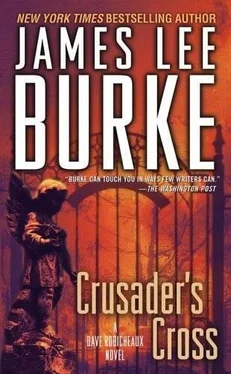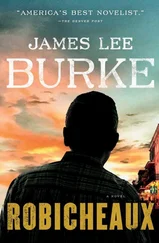"I was trying to do you a favor, for old times' sake. Screw Pitts." Bob knocked back his whiskey and drew in on his cigarette, the whites of his eyes threaded with tiny veins.
"Let me buy you a round," I said.
"I'm covered."
"See you around, partner," I said.
"You might think I'm pulling your joint, but I remember a Galveston whore by the name of Ida Whatever. She played a fiddle. No, that wasn't it. She played a mandolin. Played the fire out of it."
"Say that again?"
But he had nothing to add. Bad Texas Bob had outsmarted me. Like all corrupt people, he had wrapped a piece of truth inside a lie. To try to discern the fact from the lie was to empower the agenda of a classical manipulator, I told myself. I left Bob to his booze in Broussard, wondering if I had just revisited my alcoholic past or seen my future.
The coroner, Koko Hebert, was waiting for me when I got to work Thursday morning. He dropped his great weight down ponderously in a chair and fanned his face with his hat. His skin was flushed, his beachball of a stomach rising up and down as he breathed. A package of cigarettes protruded from his shirt pocket. He was probably the most unhealthy-looking human specimen I had ever seen. "How's life, Koko?" I said.
"Burning up out there," he said.
He pulled his tropical shirt off his chest and shook the cloth. I could smell an odor like talcum and stale antiperspirant wafting off his skin. "The contents of the DOA's purse, you got a list in your file?" he said.
"What about it?"
"Were there car keys in there, house keys on a chain, maybe a penlight on a chain, something like that?" he asked.
"Yeah, car keys," I said.
"On a chain?"
"No, as I remember, they were on a ring. They're in an evidence locker," I replied.
He held up a small Ziploc bag. Inside it was a thin piece of brass chain, no more than an inch long, with very tiny links. "Maybe this fell out of her clothes. I'm not sure. One of the paramedics found it in the body bag," he said.
"What are you getting at?"
"You said something about the DOA I couldn't forget. You said a woman who'd swallow her own wedding ring might also figure a way to tell us who killed her. So I wondered about this chain."
It was obvious humility did not come easily to Koko Hebert, and I was reminded of George Orwell's admonition that people are always better than we think they are. Koko fiddled with his Panama hat, then flipped the Ziploc bag and chain on my desk. "Did Mack Bertrand get ahold of you yet?" he asked.
Mack was our forensic chemist out at the lab. I told Koko I had not heard from him.
"The DOA's clothes had small traces of grease and rubber on them," he said.
"She was inside the trunk of a car?" I said.
"That'd be my guess. Give me a call if you need anything else." He stood up from his chair, the bottom of his stomach like a giant watermelon inside his linen slacks.
"There is one other thing, Koko. Why do you always give Helen a bad time? Why not cut her some slack?" I said.
"She's a dyke trying to do a man's job. Get a life, Robicheaux," he replied.
Lesson learned? Don't expect too many miracles in one day.
Five minutes later, Helen buzzed my extension. "I just got a call from Raphael Chalons. Clete Purcel was out at his house. Know anything about that?" she said.
"No," I replied.
"Then why was he out there?"
"Clete's uncontrollable sometimes. I've already talked to him. He doesn't listen."
There was silence on the line. I wanted to bite my tongue off. "Talked to him about what? What's he done, Dave?"
"Made a home call on Billy Joe Pitts."
"And?"
"I think he might have dropped a set of weights on Pitts's chest."
"I just don't believe this."
"That Clete went after Pitts?"
"No, that I'm having this conversation. The next time I rehire you, just put a bullet in my brain. In the meantime, straighten out this shit with Chalons."
"Why not tell Chalons to kiss your ass? He's not even in our jurisdiction."
"Bwana go now. Bwana write report and put it on my desk when he get back."
Clete's P.I. office was on Main, in an old brick building hard by the old jail, the front shaded by a solitary oak tree growing out of the sidewalk. A bell tinkled above the door when I went inside. He was sitting at a metal desk, in the middle of a large room that was bare except for two file cabinets, flipping through the pages of a notebook that he always carried in his shirt pocket. "Glad you dropped by. I did some more checking on Billy Joe Pitts and that casino over in Lake Charles." He looked at the expression on my face and raised his eyebrows. "What?"
"Helen Soileau says you fired up Raphael Chalons," I said.
"I don't read it that way."
"So tell me."
"Chalons is backing a couple of casinos in western Louisiana. He's got a religious crusader fronting points for him with some dudes in Washington. The issue is licenses for some Indian tribes who can siphon off the Texas trade before it goes to casinos deeper in the state."
"What's new about that?"
"I got a call this morning from Nig Rosewater about a couple of bail skips. Then Nig says, 'What's this about some peckerwood cop trying to put up a kite on you?' Get this – Nig says a cop went to Jericho Johnny Wineburger and offered five grand to have me clipped. Except Jericho Johnny knows better and told the cop to get fucked."
Jericho Johnny Wineburger was an old-time button man for the Giacano family and was called Jericho because his work product traveled to a dead city and did not return from it.
"You sure it was Pitts?" I said.
"Yeah, because I called up Jericho Johnny and he described Pitts exactly," Clete said.
"Pitts's beef with you is personal. Why would you put it on Raphael Chalons?"
"You're not hearing anything I say. You were right about Pitts. He works for the Chalonses. The old man is a regular with Pitts's chippies. 'Personal' is when guys like Chalons look the other way while the hired help splatter your grits. So I went out to his house and told him that. As well as a couple of other things."
"Like what other things?"
"That if he kept his stiff red-eye in his pants, he'd probably have a lot fewer problems. By the way, the guy is supposed to have a schlong on him like a fifteen-inch chunk of flex pipe. Stop looking like that. He needed a heart-to-heart. He probably appreciated it."
Clete tried to make light of his encounter with Raphael Chalons, but he and I had reached an age when cynicism and humor become poor surrogates for the rage we feel when our lives are treated with disregard. I bought him lunch at Victor's Cafeteria, then drove up the bayou to the home of Raphael Chalons.
I had always wanted to dismiss him as a vestigial reminder of the old oligarchy – imperious, pragmatic, amoral when necessity demanded it, casual if not cavalier regarding the hardship imposed by his society on the backs of blacks and poor whites. He may have been partially all those things but I also believed he was a far more complex man.
He was a strict traditionalist, even to the point of refusing to air-condition his home. But during the Civil Rights era, when a group of black men entered the clubhouse at the public golf course and were ignored by the waiters, who were also black and feared for their jobs, Chalons sat at their table and told the manager to put their drinks on his tab. After that one seminal incident, black golfers never had trouble at our public links or clubhouse again.
He became the legal guardian of orphaned children and paid for their education. I suspected he would not use profane language or be personally abusive at gunpoint. In his own mind the estate he had inherited was a votive trust, and those who would impose their way upon it risked his wrath. Sometimes I wondered if Raphael Chalons heard the horns blowing along the road to Roncevaux.
Читать дальше












